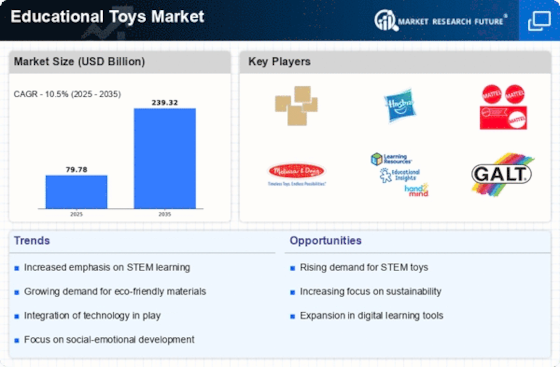Top Industry Leaders in the Educational Toys Market

Strategies adopted by key players in the Educational Toys Market often revolve around innovation and product differentiation. Companies prioritize the development of toys that seamlessly integrate education and entertainment, catering to the increasing demand from parents for toys that foster learning in a fun and engaging manner. Incorporating emerging technologies such as augmented reality (AR) and interactive features into educational toys enhances the overall learning experience, giving companies a competitive edge.
Brand recognition and reputation are paramount in the Educational Toys Market, with companies emphasizing the quality, safety, and educational value of their products. Establishing trust among parents and educators is crucial, as it influences purchasing decisions. Marketing efforts focus on highlighting the educational benefits, safety certifications, and developmental aspects of the toys, contributing to brand loyalty and market competitiveness.
Key players also actively engage in strategic partnerships and collaborations to expand their product offerings and market reach. Collaborations with educational institutions, content developers, and licensing agreements with popular characters or brands contribute to a diversified product portfolio. These partnerships not only enhance the appeal of educational toys but also strengthen the market presence of companies involved.
Market share analysis in the Educational Toys industry is influenced by factors such as distribution channels, retail partnerships, and global expansion strategies. Key players strategically collaborate with major retailers, specialty toy stores, and e-commerce platforms to ensure widespread availability of their products. Securing shelf space in prominent retail outlets and optimizing online sales channels allows manufacturers to increase visibility and accessibility, influencing their market share within the competitive landscape.
The entry of new and emerging companies into the Educational Toys Market brings innovation and diversity. Smaller players often focus on niche segments, introducing specialized educational toys targeting specific age groups, subjects, or developmental milestones. Leveraging unique educational methodologies or sustainable materials, these companies contribute to market dynamism and can compete effectively with established players.
Industry news related to the Educational Toys Market frequently covers advancements in educational methodologies, regulatory developments, and emerging trends in child development. Companies actively monitor and respond to shifts in educational philosophies, incorporating the latest research findings into their product development strategies. News related to manufacturing processes, safety standards, and technological innovations shapes the strategies of key players in the market.
Current investment trends in the Educational Toys Market reflect a focus on technology integration, online marketing, and sustainability. Companies invest in developing educational apps, interactive features, and online platforms to complement their physical toys. Digital marketing strategies, including social media campaigns and influencer collaborations, play a crucial role in reaching parents and caregivers. Sustainability initiatives, such as the use of eco-friendly materials and packaging, align with consumer preferences and contribute to long-term competitiveness.
In conclusion, the Educational Toys Market is marked by intense competition among key players who leverage strategies such as innovation, brand positioning, and strategic partnerships to maintain and enhance their market positions. The entry of new and emerging companies adds diversity and innovation to the market, with a focus on niche segments and unique educational approaches. Industry news and investment trends underscore the importance of staying abreast of educational advancements, incorporating technology, and embracing sustainability practices to remain competitive in the dynamic Educational Toys Market.
Industry News and Investment Landscape
- Collaborative efforts such as Lego's cooperation with National Geographic underscore the growing trend of branded educational experiences and content.
- A emphasis on future innovation is shown by increased spending in research and development, especially in the areas of technology integration and personalized learning solutions.
- Traditional and open-ended educational toys are in high demand due to growing worries about screen usage and the growing popularity of unplugged play.
Key Companies in the Educational Toys Market Include
- Mattel
- LEGO System A/S
- Melissa & Doug
- Ravensburger
- The Simba Dickie Group
- TOMY
- JAKKS Pacific, Inc.
- GoldLok Toys
- WowWee Group Limited
- CocoMoco Kids












